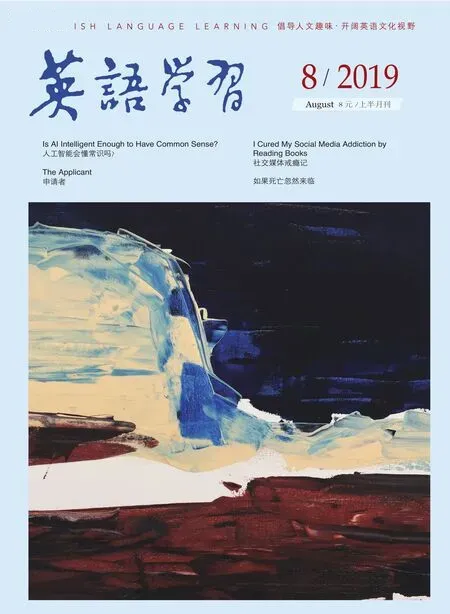“a dream come true”的前世今生
∷闫跃
“adream come true”这一结构,到底是对还是错呢?倘若是对的,又该如何理解呢?如果说它是个句子,可谓语动词又有语法错误;如果说它是个短语,那动词短语come true又应作何解释呢?本文拟对这些问题作一探讨。
一、完成式结构的历史与传承
我们知道,现代英语中,完成式由“have + 过去分词”构成。然而,在古英语中,及物动词完成式的结构为“have + 过去分词”,而不及物动词完成式的结构为“be + 过去分词”。比如,古英语中说“He is come.”表示“他已经来了。”诚然,在现代英语中,不管动词是否及物,其完成式均结合助动词have加以构成。但不可忽视的是,有少数不及物动词仍蕴含古英语遗风,其完成式存在两种结构并存的情况,且这两种结构的核心意义相同,不同之处在于,“be + 过去分词”侧重表示状态(state),而“have + 过去分词”侧重表示动作(action)。例如:
Spring is come. 春天来了,万物生机盎然。(= Spring has come and everything is full of life.)
The sun is set. 太阳下山了。(= The sun has set and is no longer in the sky.)
The city is fallen. 那座城市沦亡了。(= The city has fallen and is in a state of decay.)
The snow is melted. 雪化了。(= The snow has melted and none of it can be seen any more.)
The weeds are grown in the fields. 田里长满了野草。(= The weeds have grown everywhere and the fields are now full of them.)
同样地,以下例句均侧重表示状态,如果要侧重表示动作,则可将动词be换成have:
All hope is gone. 所有的希望都没了。
The curtains are faded. 这些窗帘已经褪色了。
The enemy soldiers were fled. 敌兵已经逃跑了。
Her father is now retired. 她父亲现在已经退休了。
They are agreed on that point. 他们在那一点上意见一致。
John is graduated with honors. 约翰已经以优异成绩毕业。
As luck would have it, the guests were just departed/returned. 客人们碰巧刚刚离开/回来。
Finally, (when they were) arrived at the top of the mountain, they decided to have a rest. 最终,到达山顶后,他们决定休息一下。

The concert was booked out, and in any case, most of the people (who were) gathered in the square could not afford the price of a ticket. 音乐会的票已预订一空,不管怎样,大多数聚集在广场上的人都买不起票。
总的来说,就完成式的结构而言,相对于“have +过去分词”,“be + 过去分词”的描述更加形象与感性,也更富有表现张力。想象一下,假如正值深秋,“The leaves have fallen.”只是对“叶子已经落下”这一情况的客观叙述,而“The leaves are fallen.”则更容易让读者联想到“落叶满地,时而随风飘起”的画面,浓浓的秋意也跃然纸上。
二、不及物动词过去分词作定语的句法理据
既然在古英语中,不及物动词的完成式需利用助动词be构成,且现代英语里仍有这一用法的残留,那么对于“关系代词 + be + 不及物动词过去分词”而言,如果里面的be动词是现在式(am/is/are)或过去式(was/were),那么,关系代词与be动词就可同时省略,这便是不及物动词过去分词作定语的最初来源。只不过英语发展至今,不及物动词过去分词作定语时,单个的分词一般只能前置;分词短语则视情况而定,前置和后置的现象均存在。
现代英语中,大部分不及物动词的过去分词不能作定语,其完成式也不能通过助动词be构成,这类不及物动词的“现代化”程度最高;但有些不及物动词的“现代化”程度就低了些,它们的过去分词可以作定语,这种不及物动词有下面两种类型:
1. 只能结合助动词have构成完成式。例如:
the absconded debtor = the debtor who has absconded 潜逃了的债务人
the eloped lovers = the lovers that have eloped私奔的情侣
the exploded bomb = the bomb that has exploded 爆炸了的炸弹
the escaped prisoner = the prisoner who has escaped 逃掉的囚犯
the settled refugees = the refugees who have settled(down) 安居的避难者
assembled soldiers = soldiers that have assembled 集合完毕的士兵
revolted subjects = subjects that have revolted 反叛的臣民
vanished civilizations = civilizations that have vanished消失了的文明wilted flowers = flowers that have wilted 已枯萎的花过去分词短语如果由“副词 + 分词”构成,二者之间可加上连字符,构成一个合成词,用作前置定语。例如:
a well-read woman = a woman who has read a lot 一位博学的女子
recently-arisen problems = problems which have arisen recently 新出现的问题
much-traveled journalists = journalists who have traveled a lot 到过很多地方的记者
需注意的是,合成词grown-up与run-away尽管也可用作前置定语,但其构成形式为“分词 + 副词”。例如:
a grown-up son = a son who has grown up 已经长大成人的儿子
run-away criminals = criminals who have run away 逃走的罪犯
2. 可以结合助动词be构成完成式。在完成式的构成形式上,这类不及物动词受古英语影响最大,其“现代化”程度也最低。例如:
an aged writer = a writer that is/has aged 一位已上了年纪的作家
a deceased partner = a partner that is/has deceased 一位已故的伙伴
the expired pact = the pact that is/has expired 期满的协议
the failed candidate = the candidate who is/has failed失败的候选人
a grown boy = a boy who is/has grown 一个已经长大的男孩
the retired manager = the manager who is/has retired已退休的经理
returned students = students who are/have returned 归国留学生
the risen moon = the moon that is/has risen 已经升起的月亮
a swollen face = a face that is/has swollen 肿起来的脸
departed youth = youth that is/has departed 消逝的青春
dated maps = maps that are/have dated 过时的地图
fallen leaves = leaves that are/have fallen 落叶
faded colors = colors that are/have faded 褪了的颜色
increased prices = prices that are/have increased 已经上涨的价格
withered roses = roses that are/have withered 已凋谢的玫瑰
a full-grown elephant = an elephant that is/has grown fully 一头成年大象(full-grown中的full是副词)
newly-arrived immigrants = immigrants who are/have newly arrived 新到的移民
值得注意的是,在现代英语中,这类分词有一部分可以直接用作形容词,因此当它们位于be动词之后时,所构成的搭配存在两种不同的解读:一种视其为古英语完成式的残留,另一种则将其看作现代英语中的系表结构。然而,两种解读下,这一搭配的核心意义和语用效果是相同的,即均表示所述对象所处的状态。此外,这类过去分词与副词、介词短语、不定式等构成的短语(含有连字符的合成词不在此列),用作定语时需后置。例如:
a guest (who is/has) just arrived from America 一位刚从美国来的客人
the train (that is/has) recently arrived at Platform One 刚到一号站台的列车
a man (who is/has) just gone to India 一个刚去印度的人
a gentleman (who is/has) returned from abroad 一位从国外回来的绅士

the student (who is/has) finished with this book 已读完这本书的学生
in days (that are/have) gone by 在往日
另外come同样可以与助动词be结合构成完成式,然而,过去分词come既不能用作前置定语,也不能单独用作后置定语,只有以它为中心词的过去分词短语才可用作定语,且需后置。例如:
Here’s a gentleman (who is/has) come to talk to you.这儿来了一位先生要跟你谈话。
After a bit, I should have thought it was a curse (that was/had) come again, if it had driven you from me. 过一会儿,我就会感觉到那是一种再次降临的灾祸,如果它把你从我这儿赶走了的话。
Monsieur the Marquis ran his eyes over them all, as if they had been rats (that were/had) come out of their holes. 侯爵老爷向他们扫了一眼,好像他们不过是一群出洞的老鼠。
三、“a dream come true”的语法解读
行文至此,不难看出,“a dream come true”实为一个名词性结构,它含有一个作后置定语的过去分词短语,该短语以过去分词come为中心词,表示主动和完成的意义。具体来说,“a dream come true”是“a dream that is/was come true”的省略形式,与现代英语中的“a dream that has/had come true”有着相同的核心意义,直译就是“一个(现在或过去)已经实现的愿望或梦想”,也可意译为“梦想成真”“愿望实现”。例如:
Having you for a friend is a dream come true. 我终于如愿以偿,与你成了好朋友。
Making it to the Olympics was a dream come true.成功晋级奥运会已是梦想成真。
Going to Hawaii was (like) a dream come true for Tom. 汤姆想去夏威夷的梦想变成了现实。
For most African-Americans, the election of Barack Obama as president was a dream come true that they didn’t think they would see in their lifetime. 贝拉克·奥巴马当选总统,大多数非裔美国人算是得偿所愿了,他们原先还以为自己在有生之年看不到这一愿望的实现。
需特别指出的是,时至今日,“a dream come true”已具有极高的固化程度,并且作为习语被广泛收录于各大词典之中,其原本的时间属性也被逐渐淡化,除了指现在或过去已经实现的梦想,它也可用来指将来才实现的梦想。例如:
If I won the tournament, it would be a dream come true. 我要是能赢得锦标赛,那就是梦想成真了。
I’ve always wanted to visit New York, so going there on vacation next month will be a dream come true for me. 我一直想去纽约,这个愿望即将实现了——下个月我就要去那里度假。

